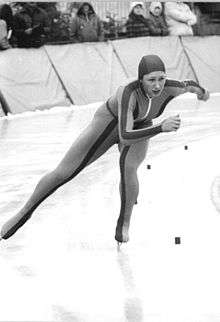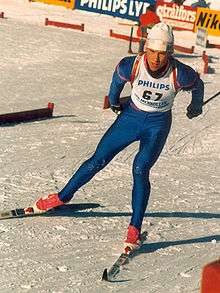1984 Winter Olympics medal table
The 1984 Winter Olympics, officially known as the XIV Olympic Winter Games, was a winter multi-sport event held in Sarajevo, Yugoslavia, from 8 to 19 February 1984. A total of 1,272 athletes representing 49 National Olympic Committees (NOCs) (+12 from the 1980 Olympics) participated in 39 events (+1 from 1980) from 10 different sports and disciplines (unchanged from 1980).[1] Compared with the previous Winter Games, the new event included was the women's 20 km in cross-country skiing, while first time NOCs to enter were Egypt, Monaco, Puerto Rico, Senegal, and British Virgin Islands.[1]
Seventeen NOCs won at least one medal and, among these, eleven secured at least one gold medal. For the first time since its debut at the 1968 Winter Olympics, East Germany topped the gold medal count with nine, three more than the Soviet Union, which had led this count in the past three Games. The Soviet delegation won the most overall medals (25), including the most silvers (10) and bronzes (9). The host nation, Yugoslavia, collected its first-ever medal at the Winter Olympics: a silver by alpine skier Jure Franko in the men's giant slalom.[2] This was the third time that the Winter Olympics host team failed to win a gold medal, after France in 1924 and Switzerland in 1928.[3][4]
Austrian athletes secured a single medal—a bronze in men's alpine skiing downhill—in what is the nation's worst ever result at the Winter Games.[5] In contrast, Czechoslovakia and Finland's performances in Sarajevo were historical bests, after collecting a total of six and thirteen medals, respectively.[6][7] Finnish cross-country skier Marja-Liisa Hämäläinen was responsible for three of her NOC's four gold medals with a sweep of victories in the women's individual events, and contributed to the bronze in the team relay event.[8] These Games also witnessed the best result by a Canadian team since the 1960 Winter Olympics, thanks mostly to the achievements of speed skater Gaétan Boucher.[9] His wins in the men's 1,000 and 1,500 metres, and a third place in the 500 metres, earned Canada's two gold medals and three of its four medals.[9] Sweden secured four golds for the first time since St. Moritz 1948,[10] of which three were obtained by cross-country skiers Gunde Svan and Thomas Wassberg. Svan and Wassberg won the men's 15 km and 50 km, respectively, and also clinched the first place in the team relay.[11] Svan was also awarded with a silver and bronze medals, thus contributing half of his NOC's medal tally.[12] For the third consecutive Winter Olympics, Great Britain's sole medal was a gold at a figure skating event,[13] this time in ice dancing by Jayne Torvill and Christopher Dean, who received the first-ever set of perfect scores in their free program routine.[14]
Medal table
The medal table is based on information provided by the International Olympic Committee (IOC) and is consistent with IOC convention in its published medal tables. By default, the table is ordered by the number of gold medals the athletes from a nation have won, where nation is an entity represented by a National Olympic Committee (NOC). The number of silver medals is taken into consideration next and then the number of bronze medals. If nations are still tied, equal ranking is given and they are listed alphabetically.
* Host nation (Yugoslavia)
| Rank | NOC | Gold | Silver | Bronze | Total |
|---|---|---|---|---|---|
| 1 | 9 | 9 | 6 | 24 | |
| 2 | 6 | 10 | 9 | 25 | |
| 3 | 4 | 4 | 0 | 8 | |
| 4 | 4 | 3 | 6 | 13 | |
| 5 | 4 | 2 | 2 | 8 | |
| 6 | 3 | 2 | 4 | 9 | |
| 7 | 2 | 2 | 1 | 5 | |
| 8 | 2 | 1 | 1 | 4 | |
| 8 | 2 | 1 | 1 | 4 | |
| 10 | 2 | 0 | 0 | 2 | |
| 11 | 1 | 0 | 0 | 1 | |
| 12 | 0 | 2 | 4 | 6 | |
| 13 | 0 | 1 | 2 | 3 | |
| 14 | 0 | 1 | 0 | 1 | |
| 0 | 1 | 0 | 1 | ||
| 16 | 0 | 0 | 2 | 2 | |
| 17 | 0 | 0 | 1 | 1 | |
| Total (17 NOCs) | 39 | 39 | 39 | 117 |
Medal distribution
See also
References
- General
- Kubatko, Justin. "1984 Sarajevo Winter Games". Olympics at Sports-Reference.com. Sports Reference LLC. Archived from the original on 27 June 2010. Retrieved 22 July 2010.
- Specific
- 1 2 "Sarajevo 1984 Winter Olympics". Olympic.org. International Olympic Committee. Archived from the original on 16 July 2010. Retrieved 21 July 2010.
- ↑ Callahan, Tom (28 February 1984). "Sport: Something to Shout About". Time. Time Inc. Retrieved 23 July 2010.
- ↑ "1924 Chamonix". Olympic.ca. Canadian Olympic Committee. Retrieved 9 October 2010.
- ↑ "1928 St. Moritz". Olympic.ca. Canadian Olympic Committee. Retrieved 9 October 2010.
- ↑ Waha, Eric (20 February 1984). "Austrian skiers hit by weltuntergangsstimmung". Anchorage Daily News. Associated Press. Retrieved 23 July 2010.
- ↑ Kubatko, Justin. "Czechoslovakia". Olympics at Sports-Reference.com. Sports Reference LLC. Archived from the original on 18 June 2010. Retrieved 21 July 2010.
- ↑ Kubatko, Justin. "Finland". Olympics at Sports-Reference.com. Sports Reference LLC. Archived from the original on 17 August 2010. Retrieved 6 August 2010.
- ↑ "Marja-Liisa Kirvesniemi". Olympic.org. International Olympic Committee. Archived from the original on 14 August 2010. Retrieved 23 July 2010.
- 1 2 Farber, Michael (20 February 1984). "Canada stands tall – thanks to Boucher and Orser". Ottawa Citizen. Ottawa. Southam News. Retrieved 23 July 2010.
- ↑ Kubatko, Justin. "Sweden". Olympics at Sports-Reference.com. Sports Reference LLC. Archived from the original on 16 September 2010. Retrieved 3 October 2010.
- ↑ Kubatko, Justin. "Sweden cross-country skiing athe 1984 Sarajevo Winter Games". Olympics at the Sports-Reference.com. Sports Reference LLC. Retrieved 3 October 2010.
- ↑ "U.S. Olympic team gets its Phil at the end". Reading Eagle. Associated Press. 20 February 1984. p. 20. Retrieved 3 October 2010.
- ↑ Kubatko, Justin. "Great Britain". Olympics at Sports-Reference.com. Sports Reference LLC. Archived from the original on 28 June 2010. Retrieved 21 July 2010.
- ↑ "British skaters perform perfectly". The Times-News. Hendersonville, N.C. Associated Press. 15 February 1984. p. 15. Retrieved 23 July 2010.
- ↑ "Enke wins fourth skating medal". Ottawa Citizen. Ottawa. Associated Press. 15 February 1984. p. 48. Retrieved 3 October 2010.
- ↑ Kubatko, Justin. "Norway biathlon at the 1984 Sarajevo Winter Games". Olympics at Sports-Reference.com. Sports Reference LLC. Retrieved 3 October 2010.
- ↑ The Official Report of the Organising Committee of the XIVth Winter Olympic Games 1984 at Sarajevo (PDF). Sarajevo: Organising Committee of the XIVth Winter Olympic Games 1984 at Sarajevo. 1984. pp. 89–90. Archived (PDF) from the original on 8 October 2010. Retrieved 11 October 2010.
- ↑ The Official Report of the Organising Committee of the XIVth Winter Olympic Games 1984 at Sarajevo (PDF). Sarajevo: Organising Committee of the XIVth Winter Olympic Games 1984 at Sarajevo. 1984. pp. 89–90. Archived (PDF) from the original on 8 October 2010. Retrieved 11 October 2010.


